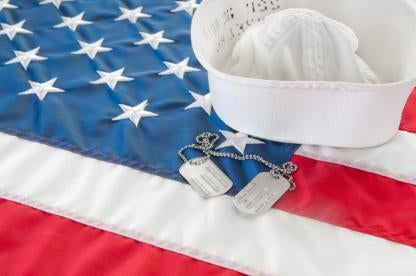When serving in the military, how you are discharged can have a big impact on how things go for you after you leave the service. A less than honorable discharge can restrict access to benefits and can force the servicemember to carry a burden that follows him or her through their post-military career. With “Don’t Ask, Don’t Tell” no longer a part of the military lexicon and sexual orientation no longer a barrier to service, many discharges are ripe for re-examination. Attorneys with Manatt, Phelps & Phillips; including Craig de Recat, partner, and Cherise Latortue, associate in partnership with the Inner City Law Center worked to correct the discharge record of Rickey Lane, who had been less than honorably discharged from the Navy in the late 70’s, in large part because of assumptions about his sexual orientation. In the process, they have created a path for others looking to do the same thing.
From the Ninth Circuit Back to the Board for the Correction of Naval Records
Because of his discharge status, Mr. Lane had been denied services from the VA, and had felt stigma because of how his discharge from the Navy was labeled. Latortue says Mr. Lane pursued this process because “he wanted to get the record straight and he wanted the record to reflect the service that he provided his country, that he excelled in bootcamp and that he was happy to be in the Navy.”
Requests to have records amended are handled through the Board for the Correction of Naval Records, or the Board. Mr. Lane’s case was complicated by the fact that his discharge had been almost thirty years ago, and the standard statute of limitations for corrections is fifteen years. In seeking a legal remedy for Mr. Lane’s situation, La Tortue and the other attorneys working on the case initiated a lawsuit in the Ninth Circuit Court, in Washington, where Mr. Lane had been when he was discharged.
In order to give Mr. Lane’s application the best chance for success, Latortue says filing in the Ninth Circuit was a strategic decision. Latortue points out, “we wanted to be in the Ninth Circuit because they had heard prior cases with similar facts that we thought would help us in our argument. “ After filing a lengthy complaint for summary motion judgment and feeling good about their chances, the government attorney reached out and offered to remand the case back to the Board, to give the board a chance to revisit the case and correct their mistake.
The Board Rules
In looking at Mr. Lane’s case, the biggest challenge was focusing on incidents in Mr. Lane’s record that the Board had initially labeled as aggravating, but upon further reflection and analysis, could not have met that standard. While serving in the Navy, Mr. Lane had received a NJP--or a non-judicial punishment--for leaving the ship without permission. Mr. Lane left the ship due to harassment he had received from his shipmates based on their erroneous perception that he was gay. His punishment in that instance was a fine--which he paid, and he continued to serve. After the incident, after the harassment, and he even earned positive commendations in his records--again, and importantly, after his NJP.
Initially, the Board had focused on this incident as an aggravating factor for his discharge, however, by providing a closer look at the record and the series of events, Latortue and other attorneys involved were able to demonstrate to the board how the initial explanation simply did not make sense. While Mr. Lane was outside the 15-year statute of limitations, Latortue says, “the board has the authority to waive the statute of limitations in the interest of justice.“ And in this case, that’s what the board elected to do. The Board amended the discharge, providing Mr. Lane with peace of mind and providing him with access to the VA’s services.
A Larger Context
This case will have a big impact on Mr. Lane’s life--as with his change in status, he will be eligible for benefits provided by the VA. In fact, Latortue says, “the board will advise that there be no further litigation, or back and forth with the VA at this point as to whether he’s eligible for benefits.” So Mr. Lane will have access to the services at the VA, and this decision clears the path for him to get the treatment and services he needs.
Further, Latortue says, this case has provided a sort of roadmap for other veterans in a similar situation. With the repeal of “Don’t Ask, Don’t Tell” many veterans have an interest in challenging their discharge status. Through what the Inner City Law Center, Latortue, and other attorneys have learned about how these cases work, Latortue says, “we can explain to our clients that this is the relief we think you’re entitled to, and we know how to get it.”




 i
i


